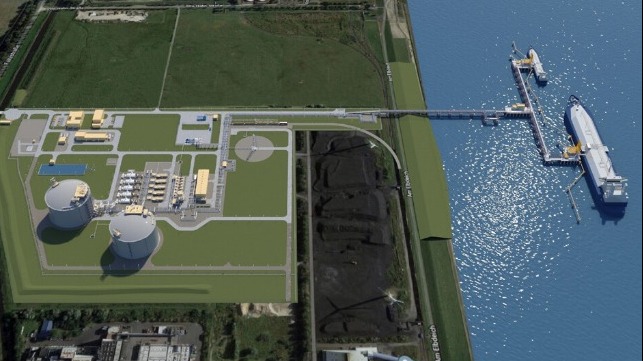Construction Starts at Wilhelmshaven on Germany’s First LNG Terminal

Construction is commencing on Germany’s first LNG terminal to support the importation of gas to replace the country’s supplies from Russia. German energy giant Uniper announced that work would begin on July 4 for the terminal to be located in Wilhelmshaven after it received accelerated approval of its application.
The new terminal was approved by the State Trade Supervisory Authority Oldenburg after Uniper filed formal applications in June. Plans for the project had been announced in March with the German government promising to speed the approval process. At the same time, the federal government chartered FSRU units to support the importation of natural gas.
The first landing terminal for LNG in Germany will be built at the Voslapper Groden transshipment facility in Wilhelmshaven. Uniper will operate the terminal at the request of the Federal Republic of Germany and they are aiming for commissioning in time to meet demand during the winter of 2022-2023. As quickly as possible, they will ramp up the capacity to reach a goal of up to 7.5 billion cubic meters of natural gas per year. That will represent approximately 8.5 percent of Germany's current annual gas demand.
"We are very pleased that things are now visibly getting underway," says Lower Saxony's Minister for the Environment, Energy, Building and Climate Protection Olaf Lies. "We need a replacement for Russian gas as quickly as possible. Every cubic meter we save will help us get through the next winter, and every cubic meter we import to Germany via alternative routes in the future will help us free ourselves more quickly from Russia's grip.” According to the minister, permitting for the new facility was completed at eight times the normal speed.
Uniper highlights that the Wilhelmshaven site offers ideal conditions from both a maritime and logistical perspective. LNG tankers of all sizes will be able to call at the facility regardless of the tides. At least two of the FSRU units chartered by the government will also be located in Wilhelmshaven, with others being targeted for locations on the Elbe near Stade, and Brunsbüttel.
The construction work in Wilhelmshaven will include onshore and seaward port infrastructure. Uniper said that all that is required for the connection to the existing natural gas pipeline network is a gas pipeline around 30 kilometers long. Work on the pipeline has already commenced by Germany's biggest pipeline network operator Open Grid Europe (OGE).

that matters most
Get the latest maritime news delivered to your inbox daily.
"The rapid approval for the early start of construction shows the importance of the LNG terminal in Wilhelmshaven for the country's security of supply,” said Klaus-Dieter Maubach, CEO of Uniper. “We are proud to be able to make a significant contribution to Germany's independence in natural gas supplies at our site in Wilhelmshaven, hopefully before the end of winter 2022/2023. In the medium and long term, our Green Wilhelmshaven hydrogen project will set the course for an even more climate-friendly energy supply."
In a second project step, Uniper will develop a permanent and expanded port solution for the FSRU. In addition, they are planning to create additional unloading and handling facilities for ammonia as part of an imitative to build Wilhelmshaven into a terminal for the handling of green gasses.
